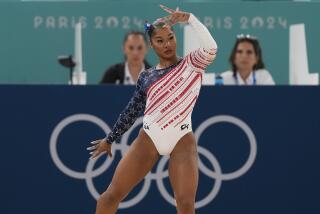U.S. Likely to Lose Gold in 2000 Relay
- Share via
The U.S. men’s 1,600-meter relay team from the 2000 Sydney Olympics, anchored by legendary sprinter Michael Johnson, should be stripped of its gold medals because Jerome Young took part in the relay after testing positive the year before for a banned steroid, track and field’s worldwide governing body said Sunday.
The case now moves to the International Olympic Committee for review, probably before the Aug. 13 start of the Athens Games. The IOC is expected to endorse Sunday’s recommendation by the International Assn. of Athletics Federations; the IOC typically allows the international federations that run the 28 sports at the Summer Games wide latitude to oversee rules and results.
In modern Olympic history, only two Americans have received medals, then been forced to return them: Jim Thorpe, who won gold in the decathlon in the 1912 Stockholm Games, and Rick DeMont, winner of gold in swimming in the 1972 Munich Games.
The IAAF action follows a June 29 ruling from the Swiss-based Court of Arbitration for Sport that Young should be stripped of his gold medal because of a positive test for the steroid nandrolone on June 26, 1999. That ruling then forced the IAAF to consider whether Young’s medal alone -- or those won by the U.S. relay team -- ought to be forfeited.
Young denies taking a banned substance. He was cleared to compete by a USA Track & Field appeals panel, acting in secret. The case has for years strained relations between U.S. and international sports authorities.
“The message is that whoever you are, full compliance with IAAF rules is mandatory,” IAAF secretary general Istvan Gyulai said Sunday in a telephone interview. “It is not possible to bypass, even if it takes four or five years for justice.”
He also said that the IAAF’s ruling council, meeting Sunday in Grosseto, Italy, voted not only to annul the U.S. team’s results in the Sydney 1,600-meter relay but to make it clear across the board that when any result includes “an athlete who is or should be ineligible [because of] a doping offense, any such result is annulled, including relays.”
A quorum of the 28-member council met in Grosseto. The only two votes in favor of saving the U.S. medals came from U.S. delegate Robert Hersh, who also had presented the case on behalf of the U.S. team, raising concerns about a conflict of interest, and from Spanish delegate Jose Maria Odriozola. Odriozola suggested the U.S. team would have won with or without Young’s participation but “the council decided this is of secondary importance,” Gyulai said.
USATF said it “regrets” the decision and would “continue to work through all appropriate channels on behalf of the affected athletes.”
If the IOC follows the IAAF lead, Nigeria would become the 2000 gold medalists in the 1,600-meter relay; Jamaica would be upgraded to silver, the Bahamas to bronze.
It had been widely known in Sydney that a U.S. athlete had tested positive for something before the Games but been cleared to compete. The athlete’s identity remained secret until last Aug. 27, when The Times identified him as Young.
The U.S. Olympic Committee confirmed last September that Young was the athlete at issue. Under threat of sanction from the USOC, USATF released its records in February, leading to the June 29 arbitration ruling.
At the Sydney Games, Young ran in the preliminary and semifinal rounds of the relay. Also running in the early rounds was Angelo Taylor. Running in the final round were Alvin Harrison, Antonio Pettigrew, Calvin Harrison and Johnson.
Alvin Harrison, who also won silver in the 400 meters at the Sydney Games, currently faces a lifetime ban on doping charges leveled by the U.S. Anti-Doping Agency, accused of using steroids and other banned substances.
His twin brother, Calvin Harrison, faces a two-year ban, accused by USADA of testing positive last year for the banned stimulant modafinil.
The relay gold was the fifth of Johnson’s career. It was Pettigrew’s first. The world champion in the 400 in 1991, Pettigrew failed to qualify for the U.S. Olympic team in 1992 or 1996 because of injuries or off performances at the trials.
“There are sentiments and emotions here,” Gyulai said after Sunday’s vote. “But the rules for the entire [track and field] community and the entire sport world are of greater importance than sentiment.”
More to Read
Go beyond the scoreboard
Get the latest on L.A.'s teams in the daily Sports Report newsletter.
You may occasionally receive promotional content from the Los Angeles Times.





